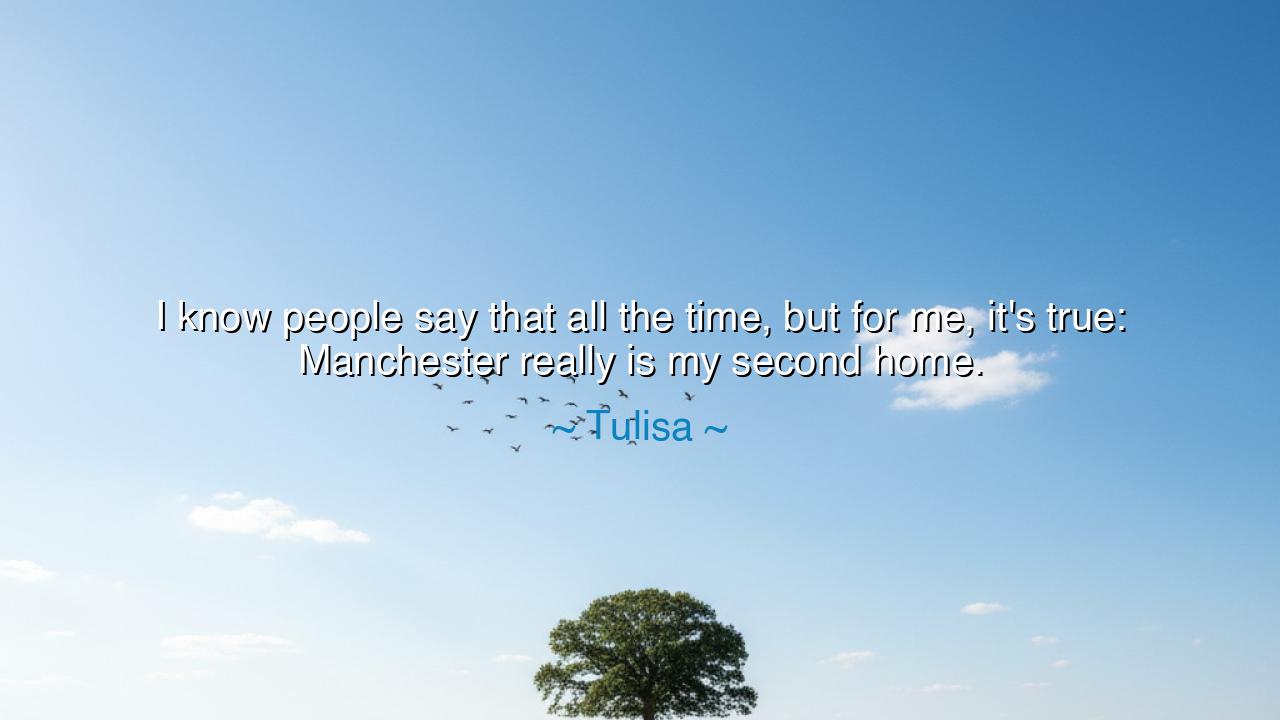
I know people say that all the time, but for me, it's true:
I know people say that all the time, but for me, it's true: Manchester really is my second home.






In the book of cities and the pilgrim heart, a singer sets down her simple oath: “I know people say that all the time, but for me, it’s true: Manchester really is my second home.” So speaks Tulisa, and her words carry the warmth of a doorway left open after midnight. Beneath their modesty lies a deep rite recognized by travelers and exiles alike: the moment when a place not of your birth becomes a place of your becoming. To name a second home is to confess that the soul can root in more than one soil, that belonging is not a cage but a covenant.
What gives a city this power? Not the stone, but the stories. Manchester, forged in mills and music, is a city that practices welcome as craft—crowds that sing back to you, shopkeepers who learn your name, rain that baptizes ambition into grit. When Tulisa says it is her second home, she speaks of green rooms and backstreets where laughter was a language, of audiences that caught her when life pitched like a stage light in a storm. She speaks of the alchemy by which a stranger becomes a neighbor: a hundred small recognitions added up to a hearth.
There is wisdom in her aside—“people say that all the time”—for our age is lavish with claims and lean in commitments. Yet the testimony endures: when the worn phrase meets a true life, it blooms again. A second home is not a slogan; it is a ledger of rides from the airport, late-night teas, songs sung shoulder to shoulder, and silences held without judgment. It is where your jokes land, your worries are understood without translation, and even your mistakes are corrected without malice.
Let history place a lantern beside this scene. Consider Alan Turing, who—though not born there—found in Manchester the workshop of his last and most daring labors, shaping the early age of computation. The city did not erase his sorrows, but it housed his genius; colleagues and corridors gave him room to think, to err, to try again. Or think on Friedrich Engels, the outsider whose years in the city taught him to read the modern world; he arrived as a visitor and left as a witness. So too with artists and athletes who came for a season and stayed for a story: the city kept their secrets and sharpened their gifts.
A humbler story also serves. A young producer, Maya, first visited Manchester to help on a club night no one expected to sell. The crowd was small but fierce; they danced as if they owed joy a debt. Afterward, an elderly doorman pressed a pasty into her hands—“You’ll need this to get home.” She laughed, then cried on the train, surprised at being seen. Months later she moved north for “just a year.” Years later, she still measures time by winters there. When she says second home, she means the alley that always smells like bread, the venue whose sound engineer knows her mix by heart, the city that taught her to be brave.
What lesson do we pass down from this? That a home can be chosen as well as inherited, and that choosing calls for reverence. Do not use a city like a stage prop; let it change your accent, your pace, your generosity. Learn its saints and scars, its jokes and griefs. Remember: the truest second home is not only where you are loved, but where you learn to love the people as they are, and to stand with them when the weather turns.
Take this counsel for the road. (1) If you would make a second home, apprentice yourself to a local craft—music night, supporters’ terrace, community kitchen—until you can serve without instructions. (2) Learn the city’s names: streets, founders, and the unsung who keep the lights on; speak them with respect. (3) Give back: buy the merch, tip the sound tech, show up for small shows and hard games. (4) Keep a gratitude ledger—note the faces that turned a map into a memory—and thank them in public. (5) In your first home, speak well of your second; in your second, honor your first. Do this, and the phrase will no longer be a cliché on the tongue but a covenant in the bones: Manchester—or whatever city claims you—truly, tenderly, your second home.






AAdministratorAdministrator
Welcome, honored guests. Please leave a comment, we will respond soon